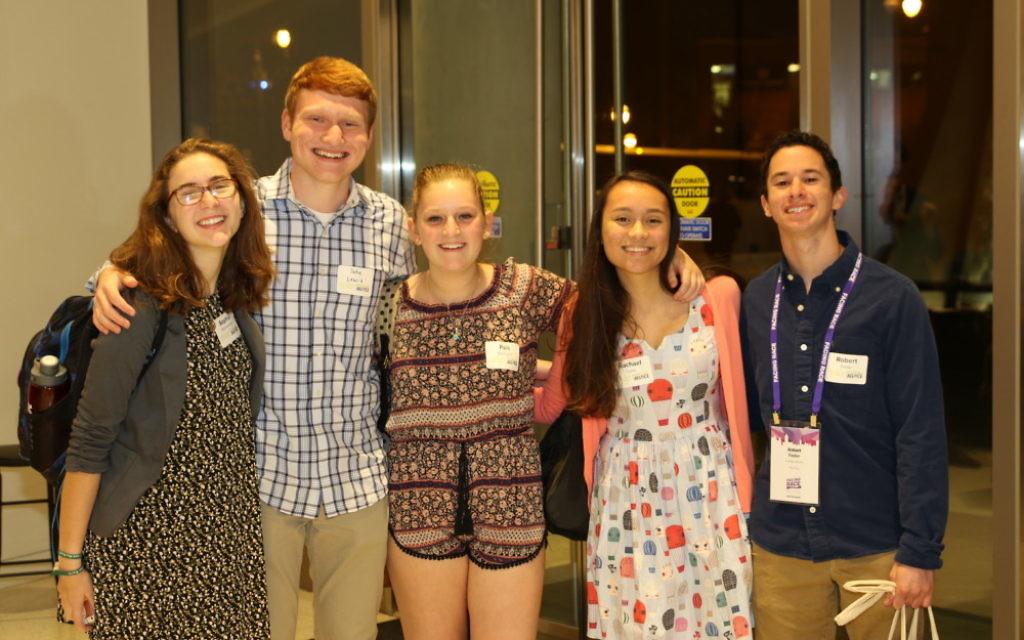Shabbat Dinner Delivers Social Justice Comfort Food

Most of the roughly 100 people who gathered for Repair the World’s Shabbat dinner Friday night, Nov. 11, needed a good laugh.
Food writer Michael Twitty provided the good and the laughs.
Twitty’s presentation at the dinner for attendees of the national Facing Race conference and for Atlantans interested in social justice acknowledged the confusion and frustration many felt in the days after Donald Trump’s presidential victory caught them off-guard. But Twitty’s style isn’t quiet acceptance.
Get The AJT Newsletter by email and never miss our top stories Free Sign Up
“I am the Trump voter’s worst nightmare,” he said, referring to his being black, Jewish and gay, then noting the irony of feeling unwanted in the America those voters envision as being great again. “I couldn’t exist in any other country in this world.”
His opening comment might have been the only time Twitty used the president-elect’s name during his dinner talk in a conference room at the National Center for Civil and Human Rights. He preferred to call Trump “treif.”
No one eating the vegetarian meal served by Repair the World objected.
The volunteer organization, which lacks a chapter in Atlanta, mobilizes young Jews to do meaningful service to address pressing problems in their communities. Its guests at the Turning the Tables Shabbat dinner included five members of the Reform movement’s North American Federation of Temple Youth: one from Miami, one from Charlotte and three from the Chicago area.
The two Southerners are leaders of Camp Jenny, the Memorial Day weekend program at Camp Coleman for students of an Atlanta elementary school who might not otherwise get to visit the North Georgia mountains. The three from Chicago work with a similar program in their city, Camp CAR.
They said they were drawn to Atlanta by the chance to learn from each other about their camp programs and by the opportunity to gain different perspectives on racial issues. They attended Facing Race and the dinner with NFTY’s Southern Area Region director, Atlantan Adam Griff.
Other locals around the room included Temple Rabbi David Spinrad, urban planner Jodi Mansbach and Gabby Leon of the Schusterman Foundation, which is working with Repair the World and OneTable to provide resources for people to hold such Shabbat dinners on a smaller scale.
Repair the World organized Jewish participation in Facing Race, which brought together 2,000 people interested in racial and social justice for three days of discussions on such topics as immigrant rights, city water systems, mass criminalization, implicit bias, and the various intersections among the racial, religious and LGBTQ concerns.

Twitty, who lives in the Washington, D.C., area and has played the role of a plantation cook at the Atlanta History Center as part of his Southern Discomfort Tour, embodies those intersections. He said he experienced regular police harassment as a young black man until he donned a yarmulke, grew out his beard and wore dark clothing as a convert to Judaism.
He joked that his troubles then shifted from local police to the Transportation Security Administration.
Naturally, he had some serious points behind the humor:
- Jews and blacks have a lot in common as minorities in America, but the ability to succeed for the two groups is not the same.
- The idea of expelling Muslims from the United States is particularly offensive because so many of the slaves who built this nation were Muslims in Africa. “Treif,” Twitty said, “you’d have to grow your own cotton.”
- It’s wrong to question someone’s Jewish origins based on that person’s appearance. Not only is someone else’s background none of your business, but who is to say what a Jew looks like?
Twitty, who found his first Jewish home in a Sephardic congregation, said he made the point with his Judaics students that their own ideas of Jewish appearance came from the stereotypes promoted by anti-Semites. “Don’t ever let your enemy define who you are.”
- Just as Jews use “we” to refer to the Israelite slaves who escaped Egypt, so we should use “we” to talk about Jews scattered around the world, regardless of their skin tone.
- Known for his promotion of kosher/soul food (black-eyed-pea hummus, matzah ball gumbo), he’s a tireless fighter for culinary justice, gaining credit where it’s due for the dishes we eat. There’s a difference between serving Southern food as old family recipes, ignoring the black cooks who created them generations back, and presenting your own version of a dish while acknowledging its cultural origin.
“No one’s ever stealing my recipes again,” Twitty said.




comments